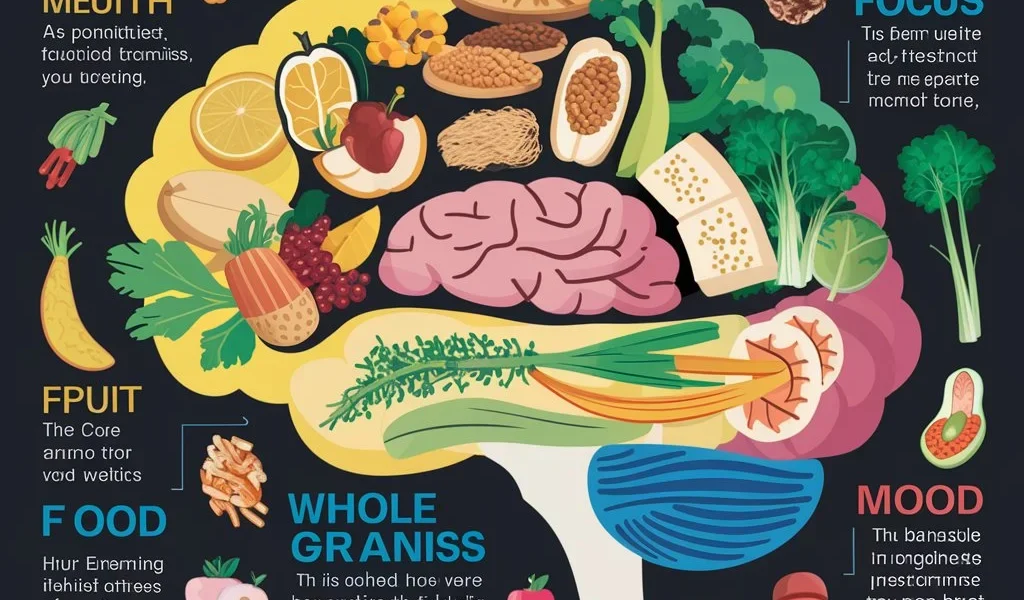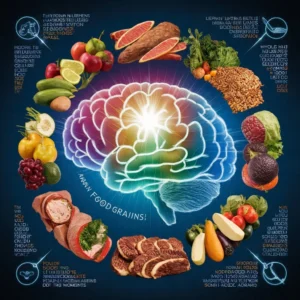In a world where the hustle and bustle of daily life can sometimes feel overwhelming, maintaining emotional balance becomes essential for our overall well-being. Did you know that the food on your plate plays a pivotal role in shaping your mood and mental resilience? Just as we nourish our bodies with vitamins and minerals, it’s equally important to fuel our minds with the right nutrients to combat stress, enhance focus, and promote a sense of calm. Join us on this culinary journey as we explore how specific nutrients can serve as powerful allies in your quest for emotional stability. From serotonin-boosting foods to omega-3-packed delights, discover how simple dietary choices can pave the way toward a more balanced and resilient you!
Nutrition and Mental Health
Have you ever noticed how a bowl of comfort food can lift your spirits, or how a nutrient-rich salad might leave you feeling more energized? The link between what we eat and how we feel is stronger than many realize. In recent years, the conversation around nutrition on mental health has gained significant traction. It’s not just about calories and diets; it’s about understanding that our emotional well-being is intricately tied to our nutritional choices.
Imagine nourishing your mind as much as your body with every bite you take. By focusing on specific nutrients known for their positive effects on mood and cognitive function, you can build resilience against stress and anxiety. Let’s explore this fascinating connection between food and feelings together!
The Role of Nutrients
The food we consume directly affects our brain chemistry, influencing how we feel and think.
Certain vitamins and minerals can elevate mood while others may contribute to anxiety or depression. For instance, deficiencies in key nutrients like B vitamins often correlate with increased feelings of fatigue and sadness.
Moreover, healthy fats are essential for neurotransmitter function. Omega-3 fatty acids support the production of serotonin, the “feel-good” hormone that helps regulate mood swings.When we prioritize nutrient-dense foods, we’re effectively nurturing our minds along with our bodies. This holistic approach fosters not only physical health but also emotional stability and clarity.
Nutrients for Mental Resilience:
Certain nutrients play a crucial role in boosting mental resilience. Among these, omega-3 fatty acids stand out for their anti-inflammatory properties and ability to support brain function. Found in fatty fish like salmon and walnuts, they can help improve mood.
- B vitamins also deserve attention. They’re essential for energy production and neurotransmitter synthesis, which are key players in regulating emotions. Foods rich in B vitamins include leafy greens, eggs, and whole grains.
- Magnesium is another powerhouse nutrient linked to stress reduction. It helps manage cortisol levels and promotes relaxation. Nuts, seeds, and dark chocolate are excellent sources of magnesium.
- Probiotics contribute significantly as well; gut health is inherently tied to mental well-being. Fermented foods like yogurt or sauerkraut introduce beneficial bacteria that support mood regulation.
Omega-3 Fatty Acids
Omega-3 fatty acids are essential fats that play a crucial role in brain health. They can significantly impact mood and cognitive function, making them vital for emotional balance.
These polyunsaturated fats are found in foods like fish, flaxseeds, and walnuts. Incorporating these into your diet can help support mental resilience.
Research shows that Omega-3s may reduce symptoms of anxiety and depression. They influence neurotransmitter pathways by promoting the production of serotonin, often dubbed the “feel-good” hormone.
Including Omega-3-rich foods in meals is simple. A salmon fillet with roasted vegetables or a chia seed smoothie can offer delicious ways to boost your intake.
For those who don’t consume enough from food sources, supplements are also an option. Fish oil capsules provide a concentrated dose without having to change your eating habits drastically.
B Vitamins
B vitamins play a crucial role in maintaining mental health. They are essential for energy production and the proper functioning of brain cells. These vitamins help regulate mood and can significantly affect your emotional state.
Vitamin B6, for example, is vital for the synthesis of neurotransmitters like serotonin and dopamine. These chemicals influence feelings of happiness and motivation. A deficiency might lead to irritability or depression.
Folate (B9) is another power player that supports cognitive function. It helps reduce levels of homocysteine, an amino acid linked to increased risks of anxiety and depression when elevated.
Lastly, B12 is key for nerve health and overall brain function. Insufficient levels can lead to memory problems or cognitive decline over time.
Incorporating foods rich in B vitamins into your diet can naturally boost your mental resilience while enhancing emotional balance.
Magnesium
Magnesium is often dubbed the “calm mineral.” It plays a vital role in regulating neurotransmitters that send messages throughout the nervous system. This helps to maintain emotional balance and reduce anxiety.
Low magnesium levels can lead to irritability, mood swings, and even depression. By ensuring adequate intake, you may find an improvement in your overall sense of well-being.
Foods rich in magnesium include leafy greens, nuts, seeds, and whole grains. Incorporating these into your meals can be simple; add spinach to smoothies or sprinkle chia seeds on yogurt for a nutrient boost.
Mindful consumption of magnesium-rich foods not only supports brain health but also promotes relaxation. So next time you’re feeling overwhelmed, consider reaching for some almonds or dark chocolate—your mind will thank you later!
Probiotics
Probiotics play a crucial role in gut health, but their benefits extend far beyond digestion. These live microorganisms can impact your mood and emotional well-being significantly.
Research shows that a healthy gut microbiome can influence the production of neurotransmitters like serotonin, often referred to as the “feel-good” hormone. When your gut is balanced with beneficial bacteria, it can help stabilize mood swings and reduce feelings of anxiety.
Incorporating probiotics into your diet is simple. Foods like yogurt, kefir, sauerkraut, and kombucha are excellent sources. You might also consider probiotic supplements if you’re looking for an additional boost.
The connection between nutrition on mental health becomes clearer when you recognize how essential these tiny organisms are for maintaining emotional balance. By nurturing your gut flora with probiotics, you’re not just supporting digestion; you’re fostering resilience against stressors too.
Antioxidants
Antioxidants play a critical role in maintaining mental health. They combat oxidative stress, which can negatively impact brain function and mood regulation. By neutralizing free radicals, antioxidants help protect our neurons from damage.
Foods rich in antioxidants, like berries, dark chocolate, and green leafy vegetables, are powerful allies for emotional well-being. These vibrant foods not only nourish the body but also enhance cognitive performance.
Incorporating a variety of antioxidant-rich foods into your diet can be simple. Consider adding blueberries to your morning smoothie or snacking on nuts sprinkled with cinnamon throughout the day.
Regular consumption of these nutrient-dense options may contribute to improved mood stability and better overall cognitive function. Embracing oxidative protection through diet is a delicious way to support mental resilience.
How these Nutrients Affect Mood and Cognitive Function
Omega-3 fatty acids play a crucial role in brain health. They support the structure of brain cells and enhance communication between neurons. Studies show that higher omega-3 intake can reduce symptoms of depression and anxiety.
B vitamins, particularly B6, B12, and folate, are essential for neurotransmitter production. These vitamins help regulate mood by facilitating the synthesis of serotonin and dopamine—key players in emotional well-being.
Magnesium is often overlooked but vital for cognitive function. It helps manage stress levels while also improving memory and learning capabilities. Low magnesium levels have been linked to increased irritability.
Probiotics contribute to gut health which significantly influences mood through the gut-brain axis. A balanced microbiome can lead to reduced anxiety and improved mental clarity.
Antioxidants combat oxidative stress in the brain, which may protect against cognitive decline. Foods rich in these compounds promote overall mental resilience by enhancing both mood stability and focus.
Foods Rich in These Nutrients and How to Incorporate Them into Your Diet
Incorporating nutrient-rich foods into your diet can be both enjoyable and beneficial for mental health. For omega-3 fatty acids, think of fatty fish like salmon or sardines. You can also sprinkle chia seeds on yogurt or blend them into smoothies.
B vitamins are abundant in whole grains, leafy greens, and legumes. Start your day with oatmeal topped with nuts and berries for a delicious energy boost.
Magnesium can be found in dark chocolate, avocados, and nuts such as almonds or cashews. A handful of these snacks during the day can help keep cravings at bay while supporting emotional balance.
Probiotics thrive in fermented foods like yogurt, kefir, kimchi, or sauerkraut. Adding a side of kimchi to meals not only adds flavor but also aids gut health.
Don’t forget antioxidants! Enjoy colorful fruits like blueberries and strawberries; they make perfect additions to salads or desse
Mindful Eating for Better Mental Health
Mindful eating is a powerful practice that can enhance your emotional well-being. Start by slowing down during meals. Take the time to savor each bite and appreciate the flavors.
Turn off distractions like TV or smartphones, allowing yourself to focus solely on your food. This attention can help you notice how different foods affect your mood and energy levels.
Pay attention to hunger cues. Eat when you’re genuinely hungry, not out of boredom or stress. This awareness fosters a healthier relationship with food.
Try engaging all your senses while eating. Notice the colours, textures, and aromas of what’s on your plate. This sensory experience can transform ordinary meals into moments of joy.
Lastly, express gratitude for what you’ve eaten at mealtime. Acknowledging nourishment promotes positivity and enhances mental clarity throughout the day.
Negatively Impact Mental Resilience through Nutrition
Lifestyle habits play a crucial role in how nutrition affects mental health. Sleep quality significantly influences emotional resilience. Insufficient sleep can hinder nutrient absorption and impact mood regulation.
Physical activity is another key factor. Regular exercise boosts serotonin levels, enhancing feelings of well-being while also improving appetite control. A sedentary lifestyle can lead to unhealthy eating patterns that negatively affect mental clarity.
Stress management techniques are essential as well. Chronic stress often leads to poor dietary choices, such as increased sugar or processed food intake. Mindful practices like yoga and meditation encourage healthier eating behaviors.
Social connections shouldn’t be overlooked either. Sharing meals with friends or family fosters positive emotions, making it easier to choose nutritious foods over quick fixes when alone or overwhelmed by daily pressures.
The Importance of a Balanced Diet for Emotional Well-being.
Maintaining emotional well-being hinges significantly on our dietary choices. The nutrients we consume play a pivotal role in shaping our mood and cognitive function. A balanced diet that incorporates omega-3 fatty acids, B vitamins, magnesium, probiotics, and antioxidants can enhance mental resilience and help us navigate life’s challenges more effectively.
Making mindful eating practices a part of your daily routine can further support this journey towards better mental health. Being aware of what you eat not only nourishes the body but also contributes to a positive mindset.
Moreover, it’s essential to recognize how lifestyle factors—such as sleep quality, physical activity, and stress management—interact with nutrition on mental health. By adopting an integrated approach that combines good nutrition with healthy habits, individuals can cultivate emotional balance and resilience over time.
Investing in your nutritional choices is an investment in your overall mental well-being. Prioritizing these elements creates a strong foundation for lasting emotional health.
FOR FURTHER INFORMATION VISIT:https://proteomics.uk/





